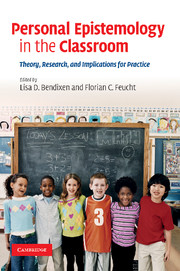Book contents
- Frontmatter
- Contents
- List of figures
- List of tables
- Contributors
- Part I Introduction
- Part II Frameworks and conceptual issues
- Part III Students' personal epistemology, its development, and its relation to learning
- 7 Stalking young persons' changing beliefs about belief
- 8 Epistemological development in very young knowers
- 9 Beliefs about knowledge and revision of knowledge: on the importance of epistemic beliefs for intentional conceptual change in elementary and middle school students
- 10 The reflexive relation between students' mathematics-related beliefs and the mathematics classroom culture
- 11 Examining the influence of epistemic beliefs and goal orientations on the academic performance of adolescent students enrolled in high-poverty, high-minority schools
- 12 Using cognitive interviewing to explore elementary and secondary school students' epistemic and ontological cognition
- Part IV Teachers' personal epistemology and its impact on classroom teaching
- Part V Conclusion
- Index
8 - Epistemological development in very young knowers
Published online by Cambridge University Press: 04 May 2010
- Frontmatter
- Contents
- List of figures
- List of tables
- Contributors
- Part I Introduction
- Part II Frameworks and conceptual issues
- Part III Students' personal epistemology, its development, and its relation to learning
- 7 Stalking young persons' changing beliefs about belief
- 8 Epistemological development in very young knowers
- 9 Beliefs about knowledge and revision of knowledge: on the importance of epistemic beliefs for intentional conceptual change in elementary and middle school students
- 10 The reflexive relation between students' mathematics-related beliefs and the mathematics classroom culture
- 11 Examining the influence of epistemic beliefs and goal orientations on the academic performance of adolescent students enrolled in high-poverty, high-minority schools
- 12 Using cognitive interviewing to explore elementary and secondary school students' epistemic and ontological cognition
- Part IV Teachers' personal epistemology and its impact on classroom teaching
- Part V Conclusion
- Index
Summary
Personal epistemology is a rapidly advancing area of research in the field of psychology concerned with the nature of human knowledge. Although epistemology has historically been pertinent to philosophers, it has more recently been adopted by psychologists concerned with how people develop, interpret, evaluate, and justify knowledge and beliefs about knowing. An understanding of epistemological development has significant implications for the ways individuals consider and approach the process of knowing and learning in a wide range of contexts, across the life span. Although much of the existing research has been focused on college students, recent work has expanded to include younger knowers and to bridge the theoretical gaps between epistemological understanding and other cognitive developmental processes, such as theory of mind. This chapter addresses the educational context of young knowers and provides research on the origins of epistemological development, with a description of two studies from our lab, one exploring epistemology and theory of mind, and the other domain specificity of epistemological development. We conclude with methodological recommendations for other researchers, suggestions for future research, and implications for educational practice.
The context of early childhood education
Although our work together has primarily been focused on basic research in expanding the developmental framework of personal epistemology to include young children, we also find the context in which young knowers develop to be of importance. Variability is a constant theme in early childhood education for three- and four-year-olds.
- Type
- Chapter
- Information
- Personal Epistemology in the ClassroomTheory, Research, and Implications for Practice, pp. 220 - 257Publisher: Cambridge University PressPrint publication year: 2010
- 16
- Cited by

